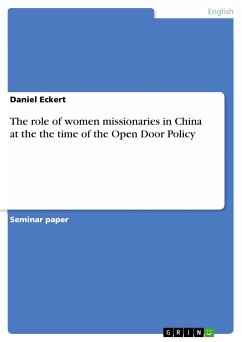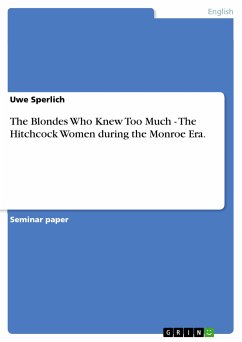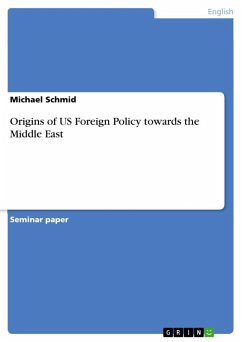Seminar paper from the year 2002 in the subject American Studies - Culture and Applied Geography, grade: 2,00, University of Regensburg (Institut für Anglistik und Amerikanistik), course: Hauptseminar US Foreign Policy, language: English, abstract: By 1900, some one thousand American Protestant missionaries wanted to convert the Chinese population to Christianity, but were frustrated because of the growing Chinese hostility towards strangers and because of the cultural gap, which seemed to be too great to overcome. Missionaries also pointed out Chinese backwardness by stressing typical traditions and customs like the superiority of men over women. A political circumstance for the missionaries` work was the then ongoing decline of the Qing Dynasty, the defeat in the Sino-Japanese War at the end of the nineteenth century, and the growing influence of the imperial powers that followed. To protect U.S. commerce in China and to preserve that nation`s independence, the then Secretary of State John Hay sent the imperial powers two notes which became known as the Open Door Policy. That policy is said to have been established because of the pressure of both economic and religious interest groups. But how did American missionaries interact with the Chinese people in daily life? How strong were the cultural ties between the two peoples? And finally, to what extend did the women missionaries help to westernize the Chinese value system? The question that overall arouses is about women missionaries, who turned out to be quite effective. In my eyes, their success is based on their female idiosyncracies, in connection with the circumstances under which they worked, namely the situation in America and the one in China. The situation back in the US was rather lucky: In contrast to the difficulties the missionaries had to face in China, missionary women were supported by feminists back home: Female supporters caused interest by stressing the courage and heroism of missionary women. American women also played a role since “[…] societies gathered housewives` extra pennies to add women`s subsidies to the support of the foreign missionary movement.“ (Hunter, 445) Therefore the starting feminist women`s movement and the housewives` financial aid played a very important role for women missionaries in China.









